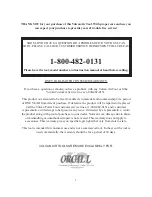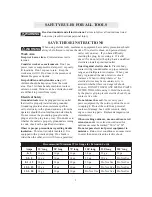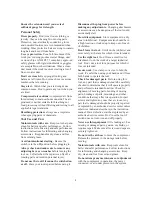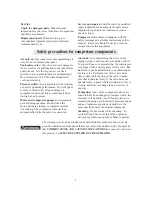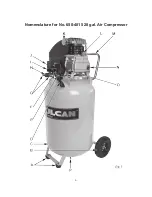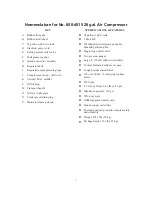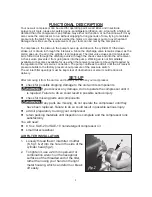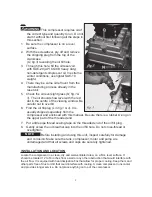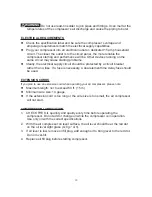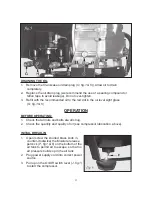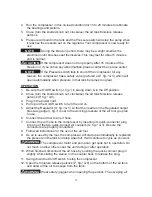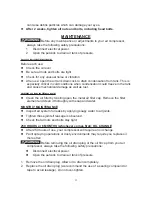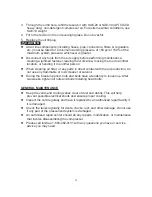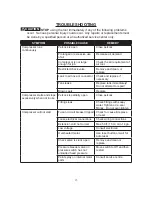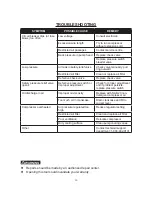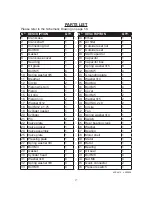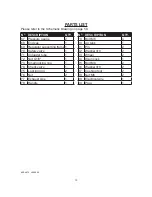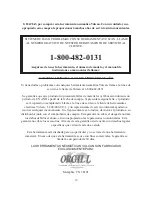
4
Ensure the extension cord you use is of
sufficient gauge for its length.
Personal Safety
Dress properly.
Don’t wear loose clothing or
jewelry; they can be caught in moving parts.
Protective, non-electrically conductive gloves
and non-skid footwear are recommended when
working. Wear protective hair covering to contain
long hair and keep it from harm.
Use eye protection.
Use a full-face mask
if the
work you’re doing produces metal filings, dust
or wood chips.
ANSI Z87.1 compliant, approved
safety glasses with rigid side-shields or goggles
are acceptable in other situations. Wear a clean
dust mask if the work involves creating a lot of
fine or coarse dust.
Don’t overreach.
Keep proper footing and
balance at all times. Do not reach over or across
machines that are running.
Stay alert.
Watch what you are doing & use
common sense. Don’t operate any tool when you
are tired.
Compressed air cautions:
compressed air from
this unit may contain carbon monoxide. The air
produced is neither suitable for breathing nor
food processing without filtering and testing to all
applicable legal standards.
Breathing protection:
always use a respirator
when spraying paint or chemicals.
Tool Use and Care
Maintain tools with care.
Keep tools sharp and
clean for better and safer performance. Follow
instructions for lubricating and safe performance.
Follow instructions for lubricating and changing
accessories. Keep handles dry, clean and free
from oil and grease.
Avoid unintentional starting.
Be sure the
switch is in the
off
position before plugging in.
Always check and make sure to remove any
adjusting keys or wrenches
before turning the
tool on. Left attached, these parts can fly off a
rotating part and result in personal injury.
Do not use the tool if it cannot be switched on
or off.
Have your tool repaired before using it.
Disconnnect the plug from power before
making any adjustments.
Changing attachments
or accessories can be dangerous if the tool could
accidentally start.
Store idle equipment.
Store
equipment in a dry
area to inhibit rust. Equipment also should be in
a high location or locked up to keep out of reach
of children.
Don’t force the tool.
It
will do the job better and
more safely at the rate for which it was intended.
Use the right tool.
Don’t force a small tool or
attachment to do the work of a larger industrial
tool. Don’t use a tool for a purpose for which it
was not intended.
Secure work.
Use clamps or a vise to hold the
work. It’s safer than using your hands and it frees
both hands to operate the tool.
Check for damaged parts.
Before using this
tool, any part that is damaged should be carefully
checked to determine that it will operate properly
and perform its intended function. Check for
alignment of moving parts, binding of moving
parts, breakage of parts, mountings, and other
conditions that may affect its operation. Inspect
screws and tighten any ones that are loose. Any
part that is damaged should be properly repaired
or replaced by an authorized service center unless
otherwise indicated elsewhere in the instruction
manual. Have defective switches replaced by an
authorized service center. Don’t use the tool if
switch does not turn it on and off properly.
Never use this equipment
if it is leaking air; has
missing or damaged parts, guards, or shields; or
requires repair. Make sure all screws and caps are
securely tightened.
Do not use the air hose
to move the compressor.
Release the pressure in the storage tank before
moving.
Maintain tools with care.
Keep tools clean for
better and safer performance. Follow instructions
for lubricating and changing accessories. Keep
dry, clean and free from oil and grease.
Do not attempt any maintenance or adjustment
with the compressor in operation, the power
connected, or air under pressure in the system.


